Saturday, 28 December 2024
Sunday, 5 November 2023
Professor of South Asia's only Jewish Studies course calls for peace...
Aheli Banerjee, The Times of India, Kolkata, November 3, 2023
Professor Navras J Aafreedi of Presidency University, who teaches the only course on Jewish history in the subcontinent, has been urging for peace in Gaza. Pro-Palestine solidarity pouring into academic spaces is bringing both sides of the Gaza conflict under the same roof.
“All my students who have opted for Jewish studies understand that conflict cannot be resolved with violence and want an immediate end to the bloodshed,” said Aafreedi.
In an atmosphere of hasty polarization throughout the country Aafreedi said rather than presuming Jewish studies as a form of Israel advocacy, one should consider the subject's heightened importance now in making students historically aware of the genesis of the conflict, and cultivating sensitivity to the issue. [...]
Talking about the unfortunate implication of many Indians adopting a pro-Israel stance as a pretext for launching Islamophobic attacks, Aafreedi clarified that despite his Muslim name, he was born a secular father with Muslim Pathan roots and a Hindu-Sikh mother, "In my case, people were surprised to find a person with a Muslim sounding name studying Jews and anti-Semitism and relentlessly trying to combat anti-Semitism," he said. ...
Sunday, 3 October 2021
Saturday, 6 February 2021
Navras J. Aafreedi & Priya Singh, eds., CONCEPTUALIZING MASS VIOLENCE: REPRESENTATIONS, RECOLLECTIONS, AND REINTERPRETATIONS (London & New York: Routledge, 2021)
Conceptualizing Mass Violence: Representations, Recollections, and Reinterpretations
Edited By Navras J. Aafreedi, Priya Singh
1st Edition | Copyright Year 2021 | ISBN 9780367699970 | 336 Pages | 8 B/W Illustrations
Published by Routledge (Taylor & Francis Group), London & New York
Series: Mass Violence in Modern History
Book Description
Conceptualizing Mass Violence draws attention to the conspicuous inability to inhibit mass violence in myriads forms and considers the plausible reasons for doing so. Focusing on a postcolonial perspective, the volume seeks to popularize and institutionalize the study of mass violence in South Asia.
The essays explore and deliberate upon the varied aspects of mass violence, namely revisionism, reconstruction, atrocities, trauma, memorialization and literature, the need for Holocaust education, and the criticality of dialogue and reconciliation. The language, content, and characteristics of mass violence/genocide explicitly reinforce its aggressive, transmuting, and multifaceted character and the consequent necessity to understand the same in a nuanced manner. The book is an attempt to do so as it takes episodes of mass violence for case study from all inhabited continents, from the twentieth century to the present. The volume studies ‘consciously enforced mass violence’ through an interdisciplinary approach and suggests that dialogue aimed at reconciliation is perhaps the singular agency via which a solution could be achieved from mass violence in the global context.
The volume is essential reading for postgraduate students and scholars from the interdisciplinary fields of Holocaust and Genocide Studies, History, Political Science, Sociology, World History, Human Rights, and Global Studies.
Table of Contents
Introduction
1. Reading Mass Violence
Navras J. Aafreedi and Priya Singh
Part 1: Narratives
2. Violence and Violations: Betrayal Narratives in Atrocity Accounts
Dennis B. Klein
3. Holocaust survivors in Mexico: Intersecting and Conflicting Narratives of Open Doors, Welcoming Society and Personal Hardships
Daniela Gleizer and Yael Siman
4. Historical Narratives, the Perpetuation of Trauma, and the Work of Vamık Volkan
Reuven Firestone
Part 2: Revisionism & Reconstruction
5. Holocaust, Propaganda, and the Distortion of History in the Former Soviet Space
Charles E. Ehrlich
6. The Genocide of 1971 in Bangladesh: Lessons from History
Srimanti Sarkar
7. Holocaust Denial and Minimization in the Indian Urdu Press
Md. Muddassir Quamar
Part 3: Education
8. Holocaust Studies in Australia: Moving from family and community remembrance to human rights and prevention of mass violence
Suzanne D. Rutland and Suzanne Hampel
9. New Developments in Holocaust & Genocide Education in South Africa: : The case study of the Johannesburg Holocaust & Genocide Centre
Tali Nates
10. A Case of Naive Normalization? India's Misbeliefs about Hitler and Schooling on the Holocaust
Anubhav Roy
11. Holocaust Education in India and its Challenges
Navras J. Aafreedi
Part 4: Reflections
12. Sonderkommando Photo 4 and the Portrayal of the Invisible
David Patterson
13. Overcoming "Intimate Hatreds:" Reflections on Violence against Yazidis
Güneş Murat Tezcür and Tutku Ayhan
14. The State and its Margins: Changing Notions of Marginality in Turkey
Anita Sengupta
Part 5: Trauma
15. Pinochet's Dictatorship and Reflections on Trauma in Chile: How much have we learned in terms of human rights?
Nancy Nicholls Lopeandía
Part 6: Memorialization
16. ‘Grassroots’ Holocaust Museums: Revealing Untold Stories
Stephanie Shosh Rotem
17. Fabric, Food, Song: The Quiet Continuities in Bengali Life Seventy Years After Partition
Rituparna Roy
Part 7: Literature
18. The Failure of Secular Publics and the Rise of the Jewish Religious Public in Nathan Englander’s For the Relief of Unbearable Urges
Fuzail Asar Siddiqi
Part 8: Dialogue & Reconciliation
19. The 2002 Alexandria Summit and Its Follow Up
David Rosen
Editors
Navras J. Aafreedi is Assistant Professor of History at Presidency University, Kolkata, and Research Fellow at the Institute for the Study of Global Antisemitism and Policy, New York. His publications include his monograph Jews, Judaizing Movements and the Traditions of Israelite Descent in South Asia.
Priya Singh is Associate Director at Asia in Global Affairs (www.asiaingloblaffairs.in). Priya is a political scientist with an interest in issues pertaining to geo-politics, nationalism, post-nationalism, identity, state formation and gender. She has authored, edited and co-edited books on Israel and the Middle East.
Contributors
- Tutku Ayhan, PhD candidate in Security Studies, Department of Political Science, University of Central Florida, USA
- Charles Edward Ehrlich, Program Director, Salzburg Global Seminar, Austria
- Reuven Firestone, Regenstein Professor in medieval Judaism and Islam at Hebrew Union College and professor of religion at the University of Southern California, USA
- Daniela Gleizer, Associate Researcher at the Instituto de Investigaciones Históricas at the Universidad Nacional Autónoma de México (UNAM)
- Suzanne Hampel, Tutor, Monash University, Melbourne, Australia
- Denis B. Klein, Kean University Professor of History and director of the Jewish Studies Program and the Master of Arts in Holocaust and Genocide Studies, USA
- Nancy Nicholls, Lecturer, Institute of History, Faculty of History, Geography and Political Sciences, Pontificia Universidad Católica de Chile
- Tali Nates, Founder and Director of the Johannesburg Holocaust & Genocide Centre, South Africa
- David Patterson, Hillel A. Feinberg Chair in Holocaust Studies in the Ackerman Center for Holocaust Studies at the University of Texas at Dallas, USA
- Md. Muddassir Quamar, Associate Fellow in the Institute for Defence Studies & Analyses, New Delhi, India
- Anubhav Roy, PhD candidate, Department of Political Science, University of Delhi, India
- David Rosen, American Jewish Committee's International Director of Interreligious Affairs and Director of its Heilbrunn Institute for International Interreligious Understanding, International President of the World Conference on Religion and Peace, Honorary President of the International Council of Christians and Jews
- Stephanie Rotem, Visiting Professor for Israel Studies at the Jewish Studies program at the University of Virginia, USA
- Rituparna Roy, Independent Scholar, Kolkata, India
- Suzanne Rutland, Professor Emerita in the Department of Hebrew, Biblical & Jewish Studies, University of Sydney, Australia
- Srimanti Sarkar, Assistant Professor, Department of Political Science, West Bengal State University, Kolkata, India
- Anita Sengupta, Director, Asia in Global Affairs, Kolkata, India
- Yael Siman, Associate Professor at the Department of Social and Political Sciences, Iberoamericana University, Mexico City
- Fuzail Siddiqi, PhD Candidate, Centre for English Studies, Jawaharlal Nehru University, New Delhi, India
- Gunes Murat Tezcur, Jalal Talabani Chair of Kurdish Political Studies, University of Central Florida, USA
Please access the abstracts here and find an article about the book here.
"...Conventionally, these editorial introductions precede several case studies across time, space, and forms of mass violence, ending with a concluding section on the afermath of mass violence, focusing on topics like post-violence justice (e.g., retributive, restorative, and transitional), memory and memorialization, and sometimes the problem of denial. Perhaps to avoid the strictures and repetitive feel of this familiar format, editors Navras J. Aafreedi and Priya Singh have put together a genuinely interdisciplinary collection that follows almost none of these usual structures overtly. Instead, the authors—refreshingly from both the Global North and South in roughly equal numbers—offer an exceptionally wide-ranging set of ruminations about very particular, at times non-intuitive, aspects of mass violence in equally particular circumstances. […] The positive consequence of this nonstandard approach is the space provided for some of the authors to take intellectually creative “deep dives” into what at first blush appear to be obscure aspects of familiar cases that turn out to be fresh and illuminating. Some chapters also focus on relatively neglected or unknown cases, and in ways that transcend a simple narration of events. The authors of the strongest chapters leverage their research and analytical expertise to hone in on very local histories and ethnographies, educational initiatives, and cultural practices that are fascinating and tell us something truly new."
- Maureen S. Hiebert, University of Calgary, Calgary, Alberta, Canada in Holocaust and Genocide Studies, Vol. 30, Issue 3. DOI: https://doi.org/10.1093/hgs/dcae052
"This co-edited book offers something rare for all scholars of mass violence and atrocities. It covers most continents and shifts the perspective from Europe to other and equally crucial atrocities all over the world. [...] This book hopes to change the landscape of how we think about mass violence but especially in the context of memory, trauma, amnesia, and history. The contributors of the book are diverse with different academic backgrounds which makes the volume a unique addition to genocide studies. [...] Finally, this book is crucial and has added value to the field of Holocaust and genocide studies that academia will benefit from especially teaching these lessons to diverse audiences."
- Mehnaz M. Afridi, Manhattan College in Genocide Studies and Prevention, Vol. 15, Issue 3. URL: https://digitalcommons.usf.edu/cgi/viewcontent.cgi?article=1853&context=gsp
"The edited volume by Navras J. Aafreedi and Priya Singh fills an important gap in mass violence scholarship with a representation of scholars from all (Asia, Africa, North America, South America, Europe and Oceania/Australasia) continents (except Antarctica) covering a wide array of themes across geographies. [...] Editors Aafreedi and Singh have done a commendable job weaving together the volume containing diverse narratives whereby one chapter flows into the next. Overall, the book is an engaging read for the ones interested in history, women’s studies, mass violence, political science, and other disciplines."
- Sayan Lodh on the website of the Centre for the Study of Plural Societies, New Delhi. URL: https://cspsindia.org/book-review-conceptualizing-mass-violence-representations-recollections-and-reinterpretations
Please order your copy today: Routledge | Amazon































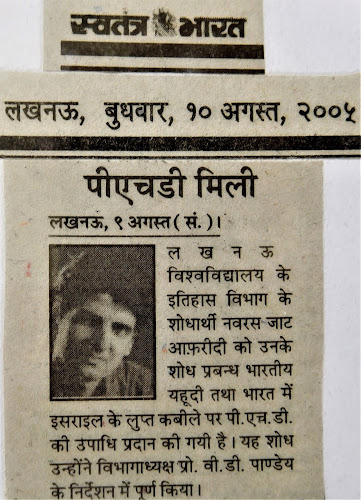








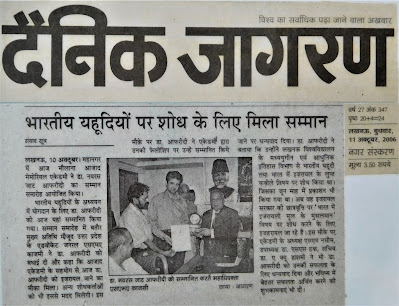

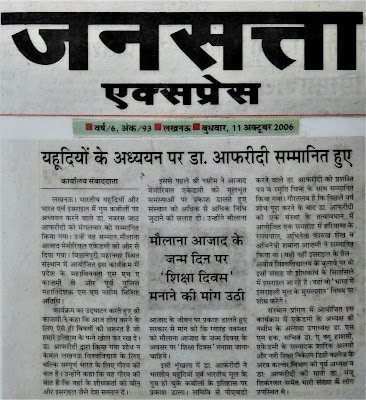






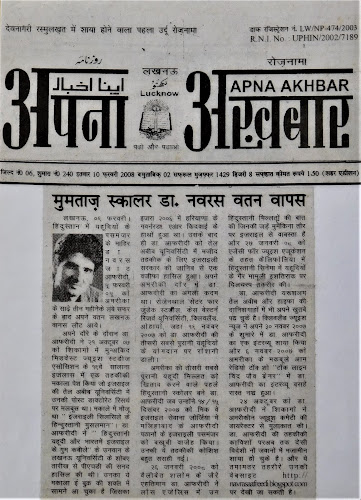









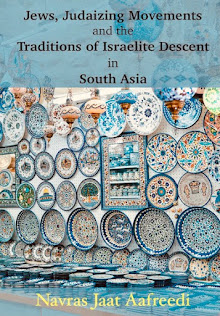





.jpg)
















